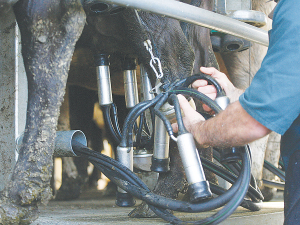Global Dairy Prices Surge with GDT Index Up 18% in 2026
Global dairy prices are on a roll, recording a fourth consecutive jump on the Global Dairy Trade (GDT) auction this year.
 Last week’s Global Dairy Trade (GDT) auction saw prices drop 2.8%, with the key whole milk powder (WMP) prices falling 4.2%.
Last week’s Global Dairy Trade (GDT) auction saw prices drop 2.8%, with the key whole milk powder (WMP) prices falling 4.2%.
Dairy prices are easing but cost inflation is down across the board, providing some relief to farmers.
Last week's Global Dairy Trade (GDT) auction saw prices drop 2.8% and the key whole milk powder (WMP) prices fell 4.2%. Most products posted price falls - the exception being anhydrous milk fat which rose 2.5%. The auction was notably weaker than pre-auction expectations and futures market trends.
Westpac chief economist Kelly Eckhold notes that support from the three main regions that usually pick up the bulk of product in the auctions was weaker this time.
"Chinese buyers pulled back further as did Middle Eastern buyers a touch. In contrast to the weaker auctions last year, this time we saw regions that don't usually feature in the top three purchasers have to pick up the slack in the auction - which presumably contributed to the weak result."
However, he says Chinese demand remains around the 10-year average.
Overall, dairy prices remain around long-term averages, but on-farm costs have increased significantly over this time.
But Eckhold says latest data shows cost increases on-farm normalised in 2023 and came in close to their forecasts at an average of 2.4% over 2023.
He points out that cost inflation fell almost across the board. The only main area where costs inflation increased in 2023 compared to 2022 was with respect to central government and local authority rates and fees.
"These high and sticky cost increases have also been felt outside the farming sector. Significant declines in costs were seen in fertiliser, feed and fuel which was in large part due to the easing in supply-chain pressures seen globally now that Covid and the impact of the Russian war in Ukraine are a bit further behind us."
However, debt servicing costs remain elevated and are expected to remain high over 2024 as the RBNZ brings inflation under control.
Eckhold believes a saving grace is that interest rates currently look to have peaked. Wages costs are expected to moderate from the very high levels seen in recent years as the labour market continues to ease.
"The outlook for on-farm costs is relatively flat from here. As most cost categories have now normalised, we now see on-farm inflation trending close to aggregate economy inflation rates in the coming couple of years. That means on-farm cost inflation at around 3% in 2024 and 1.9% in 2025," he says.
Dairy Women's Network (DWN) has announced that Taranaki dairy farmer Nicola Bryant will join its Trust Board as an Associate Trustee.
Rural Women New Zealand (RWNZ) says it welcomes the release of a new report into pay equity.
Red meat exports to key quota markets enjoyed $1.4 billion in tariff savings in the 2024-25 financial year.
Remediation NZ (RNZ) has been fined more than $71,000 for discharging offensive odours described by neighbours as smelling like ‘faecal and pig effluent’ from its compositing site near Uruti in North Taranaki.
Two kiwifruit orchards in the Bay of Plenty and one in Northland are this year's finalists for the Ahuwhenua Trophy competition.
The Government's chief science advisor, Dr John Roche says the key objective for the science sector in the coming year is bedding down the reforms which sees the merger of the previous entities.

OPINION: A mate of yours truly reckons rural Manawatu families are the latest to suffer under what he calls the…
OPINION: If old Winston Peters thinks building trade relations with new nations, such as India, isn't a necessary investment in…